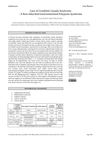 1 citations,
August 2013 in “Springer eBooks”
1 citations,
August 2013 in “Springer eBooks” Birth control pills and anti-androgen medications help manage hair growth, acne, and hair loss in women with PCOS.
 1 citations,
October 2000 in “Pediatrics in Review”
1 citations,
October 2000 in “Pediatrics in Review” The document says that hookworms are treated with mebendazole and stress-related hair loss usually gets better in 6 months, while other hair loss types have specific treatments.
 1 citations,
March 1997 in “Journal of the American Pharmaceutical Association”
1 citations,
March 1997 in “Journal of the American Pharmaceutical Association” Pharmacists play a key role in helping patients use over-the-counter products correctly, including those for hair regrowth and smoking cessation.

There are many treatments for common hair loss, but more trials are needed to decide which are best.
 July 2022 in “Singapore Medical Journal”
July 2022 in “Singapore Medical Journal” Most children with alopecia areata improved with treatment, but those with more hair loss had worse outcomes.
 March 2021 in “Clin-Alert”
March 2021 in “Clin-Alert” The FDA warned about safety issues with remdesivir and tofacitinib, finasteride is linked to suicidality, potent topical corticosteroids increase osteoporosis risk, henna can cause hemolysis in G6PD deficiency, chemotherapeutic agents can cause adverse reactions, drug interactions are common in cancer patients, ketamine can reduce at-risk drinking, high dose of anticholinergics increases dementia risk in Parkinson's patients, and prenatal exposure to second-generation antipsychotics increases pregnancy complications.
 December 2020 in “International journal of research in ayurveda and pharmacy”
December 2020 in “International journal of research in ayurveda and pharmacy” Eating well and avoiding synthetic hair products are key for healthy hair.

Topical calcipotriol successfully treated hair loss in three patients with Alopecia Totalis.
 October 2019 in “Journal of Evolution of Medical and Dental Sciences”
October 2019 in “Journal of Evolution of Medical and Dental Sciences” A 56-year-old man was diagnosed with Cronkhite-Canada Syndrome after showing symptoms like diarrhea, weight loss, and skin changes.
 November 2015 in “Clin-Alert”
November 2015 in “Clin-Alert” Some medications and supplements can cause serious side effects, including hair loss, heart rhythm problems, liver injury, and other health issues.










